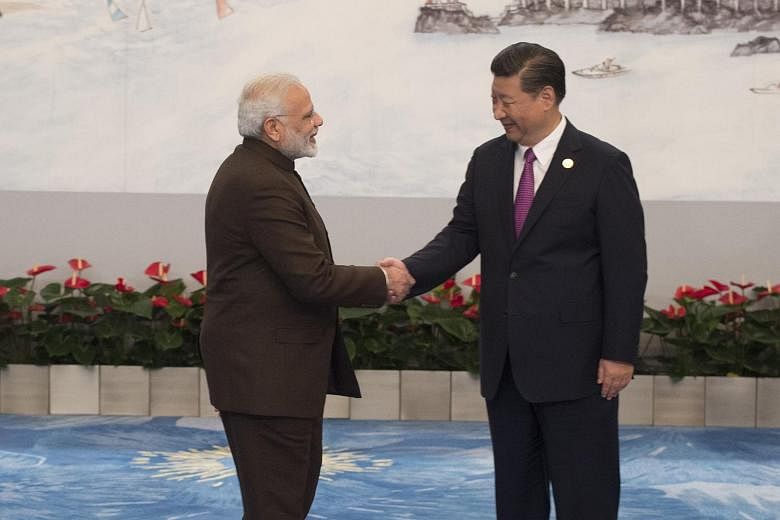XIAMEN (REUTERS) - China wants to put its relationship with India on the "right track", President Xi Jinping told Prime Minister Narendra Modi on Tuesday (Sept 5), as the two countries sought to mend ties damaged by a recent tense Himalayan border standoff.
The meeting was the first between the two leaders since Chinese and Indian troops ended a standoff in the Doklam border region about a week ago that was the neighbours' most serious military confrontation in decades.
Talks between Xi and Modi had been in question before the de-escalation, which came just in time for China to host the BRICS summit of emerging economies, which also includes Brazil, Russia and South Africa, in the south-eastern city of Xiamen.
Healthy, stable ties were in the interests of both countries, Xi told Modi in a meeting on the sidelines of the summit, according to a statement from China's foreign ministry.
"China is willing to work with India ... to increase political trust, advance mutually beneficial cooperation and promote the further development of China-India relations along the correct path," Xi said.
"China and India must maintain the fundamental determination that each other constitute mutual development opportunities and do not constitute a mutual threat," Xi said, adding that peaceful, cooperative relations were the "only correct choice".
Xi and Modi spoke for more than an hour and the discussions were "constructive", Indian Foreign Secretary Subrahmanyam Jaishankar told reporters in Xiamen after the meeting.
"There was a sense that if the relationship is to go forward, then peace and tranquility on the border area should be maintained," Jaishankar said, adding that both sides agreed that strong contacts between their defence personnel were needed to prevent another border incident.
"On both sides there was a sense that more efforts need to be made to ensure that these kinds of situations don't reoccur." Pressed on how the Doklam dispute was discussed, Jaishankar said, "Both of us know what happened. This was not a backwards looking conversation. This was a forward-looking conversation."
Hundreds of troops were deployed on the Doklam plateau, near the borders of India, its ally Bhutan, and China after New Delhi objected to China building a road through the mountainous area. The quiet diplomacy that ultimately ended in de-escalation was based on a principle of stopping "differences becoming disputes" that Modi and Xi had agreed at a June meeting in Astana, an Indian official has said.
Still, China and India remain divided on many fronts, including India's deep suspicions of China's growing military activities in and around the Indian Ocean.
For its part, Modi's government has upset China with its public embrace of Tibetan spiritual leader Dalai Lama, whom the Chinese regard as a dangerous separatist, and growing military ties with the United States and Japan.
China has said its forces will continue to patrol in Doklam, which is claimed by Bhutan, and that it hoped India had learned a lesson from the incident.

